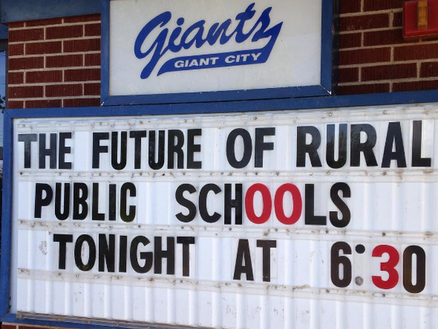Good day to the AIRSS community,
Amidst all the madness of state budget crisis, school funding reform, SB1 and amendatory vetoes, the negativity about our schools and communities has reached a fever pitch. For me personally, I am tired of all the negative rhetoric, tired of the negative images portrayed about our schools, our communities and our state, and mostly tired of the general notion of Illinois not being a good place to live and work.
I think we all need the occasional reminder of the good that exists in our respective communities, and sometimes it takes a third party perspective to remind us of what we have. For me, that reminder come recently when I invited Dr. Gary Funk, Director of the Rural Schools Collaborative to serve as our keynote speaker at the recent AIRSS/Illinois Humanities town hall meetings in the southern part of the state.
As we toured the area, visited schools and communities and Gary had the opportunity to visit with a number of stakeholders, he shared with me his thoughts, observations and perspective on our rural schools, communities and the region. I believe his observations are a microcosm of the rest of our rural schools and communities statewide and I asked if he would share his thoughts in writing.
Please take time to read Dr. Funks piece entitled Challenges and Opportunities in Rural Southern Illinois, and his prospective on the riches of the region, our rural schools and communities.
David Ardrey
Executive Director
Association of Illinois Rural and Small Schools
After a visit to the Little Egypt region of Southern Illinois, RSC director Gary Funk reflects on how rural communities can leverage their unique assets through the community hub of rural public schools.
The recent school funding battles in Texas, Illinois and Pennsylvania, to name a few, have sadly reminded me of how public education has been turned into a political wedge issue over the last four decades. These often disingenuous efforts have weakened America’s commitment to strong local schools, fractured communities, and hindered the continued good efforts of so many outstanding teachers. Still, I remain optimistic about the future of public education, and I am more convinced than ever that public school leaders, teachers and students have the opportunity to usher in an era of rural renewal. A recent trip to Illinois’ Little Egypt region reinforces these beliefs and gives me a real sense of hopefulness.
Thanks to Illinois Humanities and the Association of Illinois Rural and Small Schools, I had the opportunity to visit several southern Illinois communities and discuss the Future of Rural Education. I truly enjoyed all three of the community conversations, and the folks at Egyptian School, Cobden High School and Giant City School were kind and welcoming.
The challenges facing rural schools and communities are real and troubling, but what struck me most about my visit to “Little Egypt” was the region’s amazing bounty of assets. First, it is an area that is rich in beauty and ecological diversity. There are not many places where you can find hiking, water sports, cycling and agricultural tourism in such close proximity. This is something to celebrate and build on.
Varied agricultural assets are another southern Illinois strong suit. Wineries, orchards, and small local farms combine withlarger-scale agricultural operations in ways that complement the scenic aspects of the region. Not only do these activities provide jobs and attract visitors, but they also give communities an opportunity to develop local foods systems, something that will be essential for a sustainable rural future. Again, something to build upon.
Since the Rural Schools Collaborative focuses on the relationships between school and community, I would be remiss not to point out how impressed I was with the three schools I visited. Certainly, the schools have challenges and needs, but in all three settings it was readily apparent how each school was a thriving community hub—a home for the arts, local culture, athletics and learning. This all reminded me how rural schools have become the community commons, a public place where people come together in purposeful ways.
Connecting these assets is southern Illinois’ distinct sense of region. Bounded by iconic rivers, laced with hills and streams, woven with trails, Little Egypt is easy to get your arms around. Still, as geographically defined as it is, its diversity stands out, both in demographics and topography. In just a matter of minutes one can literally travel from the Delta to the Ozarks, and this is something to celebrate, enjoy and nurture.
Finally, undergirding all of this is Southern Illinois University Carbondale itself, a public research university with a rich institutional history. With the human resources to serve, the infrastructure to support, and the ability to articulate, the University is uniquely positioned to provide high quality place-based learning and, at the same time, do so in a way that enhances the public good.
More than 130 years ago the explorer John Wesley Powell suggested watersheds should shape American state boundaries. It is in this spirit that virtually all rural scholars and futurists strongly recommend regional approaches to rural development. It seems to me that Little Egypt has the tools and resources for a robust regional future, one that can be both fulfilling and exemplary, one in which teacher-leaders can play a formative role.
Wherever we live, this opportunity to lead, educate, collaborate and change is something that we all share.
Rural Schools Collaborative believes that using place to inform rural teaching, developing rural teacher leaders, and strengthening rural philanthropy helps small towns thrive. Learn more about our work.
This piece was created in cooperation with Rural Schools Collaborative partner, the Association of Illinois Rural and Small Schools.

